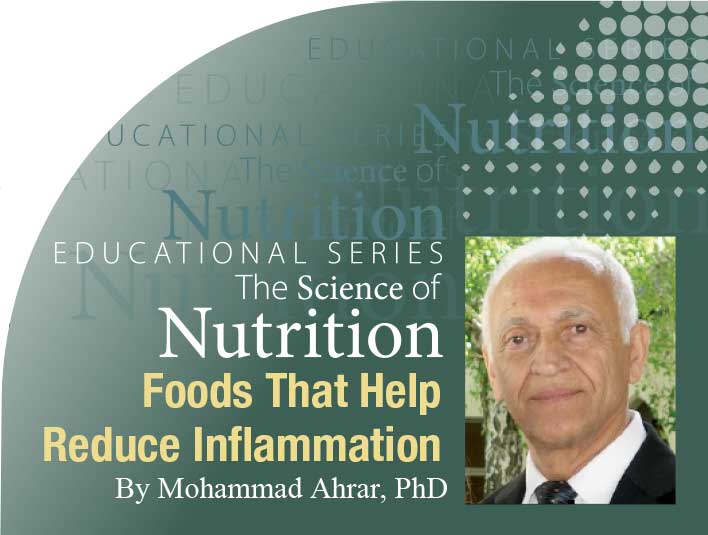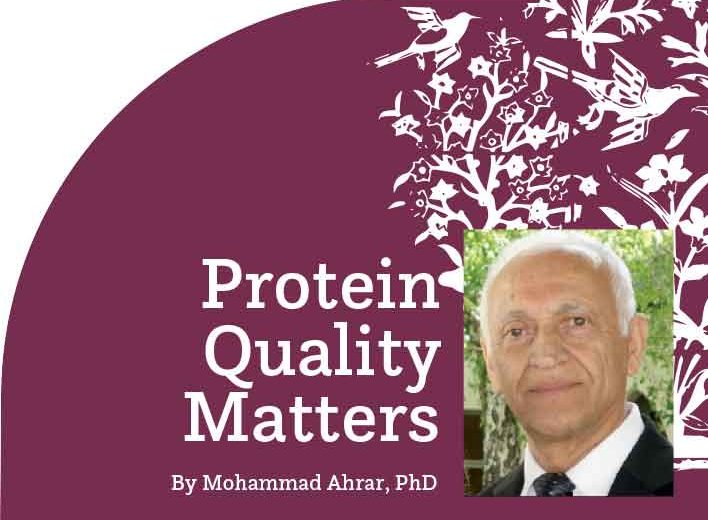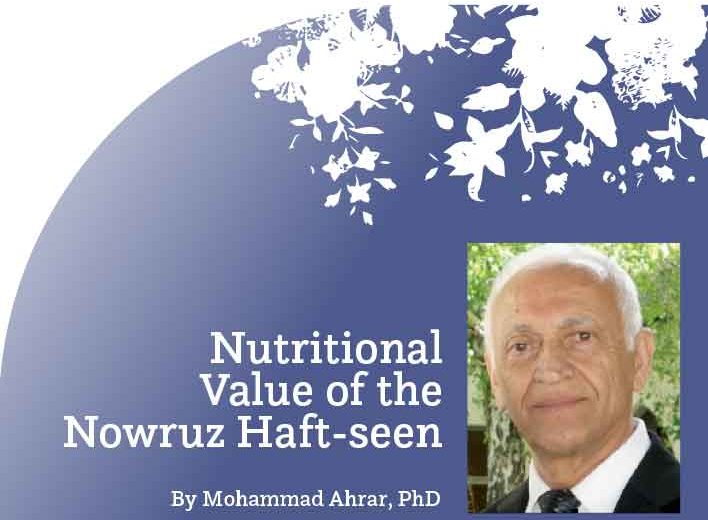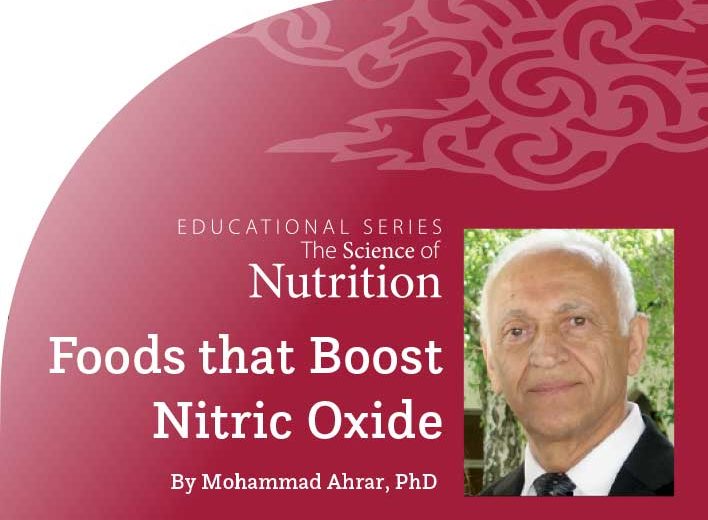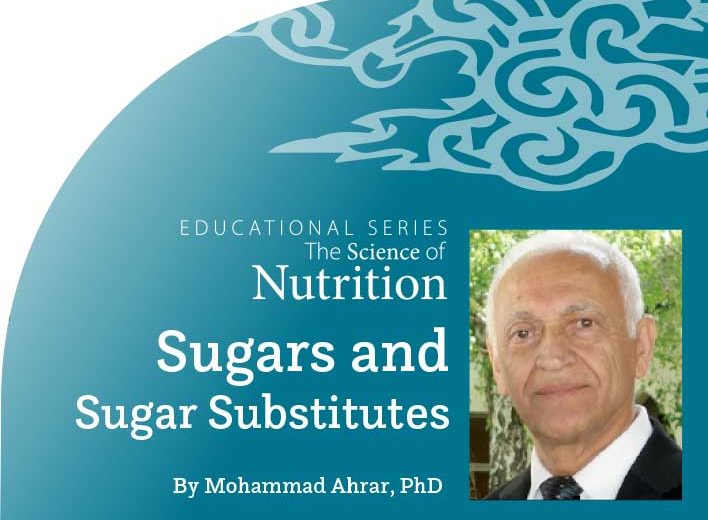Educational Series
The Science of Nutrition
Foods That Help Reduce Inflammation
By Mohammad Ahrar, PhD
Introduction
Persistent inflammation can be linked to a range of disorders and health issues. In this article, we will review the benefits of foods and nutrients that help reduce inflammation.
Facts about inflammation
Inflammation is the body’s natural response to safeguard against infection. In other words, inflammation is part of the body’s immune response. However, sometimes, inflammation can persist longer than necessary, causing more harm than benefit. It can be a result of bacterial, viral, fungal infections, air pollution, or it can be a reaction to the foods that we eat. Many major diseases, such as cancer, heart disease, diabetes, and arthritis, have been linked to chronic inflammation. Inflammation can also affect blood flow to the brain, leading to cognitive decline and Alzheimer’s disease.
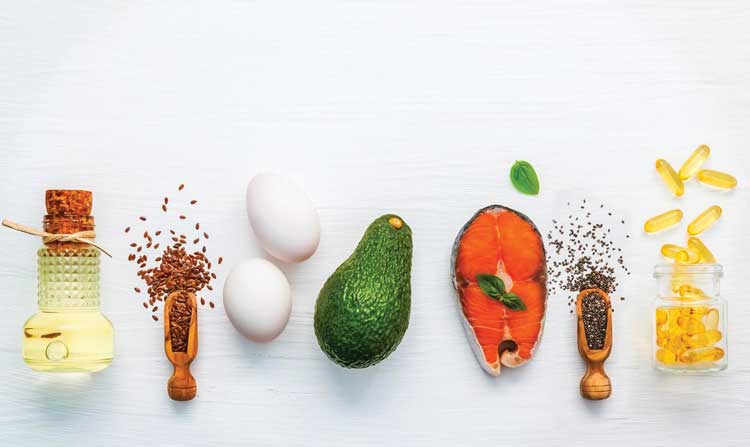
How can foods help or prevent inflammation?
Studies show that there is a direct link between diet and inflammation. Chronic inflammation can be reduced with certain bioactive compounds found in food, including resveratrol in the skin of red grapes, theaflavins in tea, and omega-3 fatty acids in flaxseed and fish. Use of these compounds in a diet may regulate the gene expression that causes inflammation. Some foods are rich in antioxidants which can reduce oxidation associated with many chronic inflammations. Therefore, foods that contain antioxidants play a major role in controlling inflammation.
Common sources of antioxidants
Foods that contain carotenoids Most fruits and vegetables contain natural pigments such as carotenoids and xanthophyll. Carotene is a type of carotenoid which is plentiful in colorful fruits and vegetables. Cantaloupe, watermelon, apricots, nectarines, peaches, pink grapefruit, tangerines, and mangoes are high in carotenoids. Leafy greens, herbs, carrots, green peppers, kale, asparagus, beets, broccoli, corn, turnip, pumpkin, squash, spinach, sweet potato, tomatoes, plus cherries and berries, are also rich in antioxidants. Other foods such as lentils and beans, nuts and seeds, whole grains, green tea, and certain spices, such as ginger and turmeric, are rich in antioxidants as well. More information about antioxidants can be found in Peyk #184.
Vitamin C This vitamin is abundant in berries, broccoli, brussels sprouts, cantaloupe, cauliflower, grapefruit, honeydew, kale, kiwi, mango, nectarine, orange, papaya, strawberries, tomatoes, and red, green, or yellow peppers. For more information about the properties of vitamin C, please visit Peyk #173.
Vitamin E This fat-soluble vitamin is abundant in broccoli (boiled), avocado, chard, mustard and turnip leaves, mangoes, nuts, papaya, red peppers, spinach (boiled), and sunflower and pumpkin seeds. For more information about the beneficial effects of vitamin E, isit Peyk #171.
Omega-3 fats Foods that contain omega-3 fatty acids play a role in altering the inflammatory process and regulation of pain as a result of inflammation. Salmon, tuna, trout, mackerel, and herring are high in these fats. Soy-based foods, walnuts, pecans, and flaxseed are also good sources of omega-3 fats. More information about omega-3 fatty acids is provided in Peyk #160.
Lycopene and flavonoids These potent antioxidants are abundant in tomatoes. The processing of tomatoes, such as through boiling or steaming, significantly increases the bioaccessibility of lycopene and flavonoid content in the fruit.
Probiotics The indigenous probiotic bacteria—mainly bifidobacteria, lactobacilli, and some other lactate-forming bacteria—have beneficial effects on human health, mainly by modulating the lining of the intestine and the body’s systemic immunity, as well as improving microbial balance in the large intestine. Consumption of fermented dairy products that contain the mentioned species of bacteria may elicit anti-tumor and anti-mutagenic effects, which have been attributed to decreased tumor promoting agents, leading to suppression of tumors.
Turmeric The spice that comes from the root of the turmeric plant contains the chemical curcumin and other chemicals that have powerful antioxidant and anti-inflammatory effects. However, the curcumin content of turmeric is not high (about 3% by weight) and is poorly absorbed into the bloodstream. Research suggests that it helps to consume black pepper—which contains piperine, a natural substance that enhances the absorption of curcumin by many folds—along with turmeric. Turmeric is fat soluble, so it may be a good idea to take it with some fat in the diet. Turmeric has been studied as a beneficial herb in many diseases, including cancers such as colorectal cancer and Alzheimer’s disease. Inflammation and oxidative damage to neurons play a role in Alzheimer’s disease; as turmeric has beneficial effects on both, it can reduce the risks of the disease. In addition, a key feature of Alzheimer’s disease is a buildup of protein tangles called amyloid plaques; studies show that the curcumin can help clear these plaques. Turmeric has been used to reduce inflammation of the joints. Arthritis, a common disorder characterized by joint inflammation, may be benefitted by the curcumin in turmeric.
Which foods cause inflammation
The foods that you eat can significantly affect inflammation in your body. Some foods that can cause inflammation are listed below:
Sugar and high-fructose corn syrup Table sugar (sucrose) and high fructose corn syrup (artificially made) are the two main types of added sugar in the Western diet. Sucrose is made of glucose and fructose. Fruits and vegetables contain small amounts of both sugars and in the correct proportion. Excess fructose from fructose corn syrup causes inflammation within the endothelial cells that line your blood vessels, which is a risk factor for heart disease. When the smooth lining of the arteries and small arterioles get roughened as the result of inflammation, fats and cholesterol can attach to the endothelium, clog the arteries, and bring about heart attack and stroke. Diets high in sugar and high fructose corn syrup may also counteract the anti-inflammatory effects of omega-3 fatty acids (see Peyk #160).
Artificial trans fats Artificial trans fats are created by adding hydrogen to good fats—such as unsaturated fats, which are liquid—to give them the stability of a more solid fat for better marketing. Trans fats are often listed as partially hydrogenated oils on food labels. Unlike the naturally occurring trans fats found in dairy and meat, artificial trans fats have been shown to cause inflammation and increase the risk of some diseases.
Trans fats lower HDL (known as good cholesterol) and also may impair the function of the endothelial cells lining your arteries, which is a risk factor for heart disease. Foods high in trans fats include French fries and other fried fast foods, some varieties of microwave popcorn, certain margarines and vegetable shortenings, and packaged cakes and cookies.
Omega-6 fatty acids Studies suggest that some vegetable oils contain high proportions of omega-6 fatty acid to omega-3 fatty acids, which may promote inflammation when consumed in high amounts. However, the evidence is inconsistent, and more research is needed. See Peyk #160 for more information.
Refined carbohydrates Carbohydrates have a bad rap, but the truth is that not all carbs are problematic. Refined carbs, which have most of their fiber removed, are not considered good carbs—they may encourage the growth of inflammatory gut bacteria that can increase the risk of obesity as well as inflammatory bowel disease. Refined carbs have a higher glycemic index (GI) than unprocessed ones. The Glycemic Index is an index for how fast glucose is absorbed into the bloodstream. High GI foods raise blood sugar more rapidly than low GI foods, which influence the pancreas to release more insulin. This effect can cause obesity in most people.
Excessive alcohol Moderate alcohol consumption, mainly red wine, has been shown to provide some health benefits. However, high doses of alcohol can lead to severe problems. Alcohol is a toxin and the liver must work hard to detoxify it. Studies show that people who drink heavily may develop problems with bacterial toxins moving out of the colon and into the body. This condition—often called “leaky gut”—can drive widespread inflammation that leads to organ damage.
Processed meat Common types of processed meat include sausage, bacon, ham, smoked meat, and beef jerky. Harmful compounds are formed when protein or fat combine with sugar when added to some processed foods. Chemicals (such as glycan) are formed by cooking meats and some other foods at high temperatures. Foods that have been exposed to high temperatures, such as during grilling, frying, or toasting, tend to be very high in these compounds which are known to cause inflammation. Consuming excessive processed meat is associated with an increased risk of heart disease, obesity, diabetes, and stomach and colon cancers.
Frying Although frying may give flavor to food, the frying process results in substantial oxidation of frying oil, with increased lipid oxidation. There is also a greater likelihood that aldehydes will form during frying, which can react with amino acid lysine (an essential amino acid) to render it unavailable for absorption. Additionally, some vitamins will also be destroyed during the high temperature of frying. Thermally oxidized lipids enhance peroxidation of cell membranes, which could potentially lead to carcinogenesis. Researchers have also discovered the presence of certain aldehydes in food, which are believed to be related to some neurodegenerative diseases and some types of cancer. These toxic compounds can be found in some oils, such as sunflower oil, when heated for frying; sunflower and linseed oil (especially sunflower oil) are the ones that create the most toxic aldehydes in a short time.
Summary
A quote from experts at Harvard Medical School: “What do heart disease, obesity, rheumatoid arthritis, diabetes, gout, asthma, and other chronic conditions have in common? Inflammation!” But the good news is that carotenoids, vitamin C, and vitamin E (rich in most fruits, vegetables, and seeds), omega-3 fatty acids (in seafood and walnuts), and turmeric are among the foods that reduce inflammation. To take control of your health, incorporate them into your diet today.
_______________________________________________
References
1- Modern Nutrition in health and disease, Maurice E. Shills, et. al., 10th ed. Lippincott, Williams and Wilking.
2- Nutrition: from science to you, Joan Salge Blake, Kathy D Munoz, and Stella Volpe-3rd ed., Pearson Education, Inc. (2016).
3- https://www.health.harvard.edu/staying-healthy/foods-that-fight-inflammation
4- https://www.painexpertnews.com/turmericcbd_clean_pb/
5- https://www.sciencedaily.com/releases/2019/09/190926161356.htm
6- https://www.nature.com/articles/s41398-019-0528-0
7- https://www.healthline.com/nutrition/6-foods-that-cause-inflammation#1
8- https://www.ncbi.nlm.nih.gov/pmc/articles/PMC5616019/

